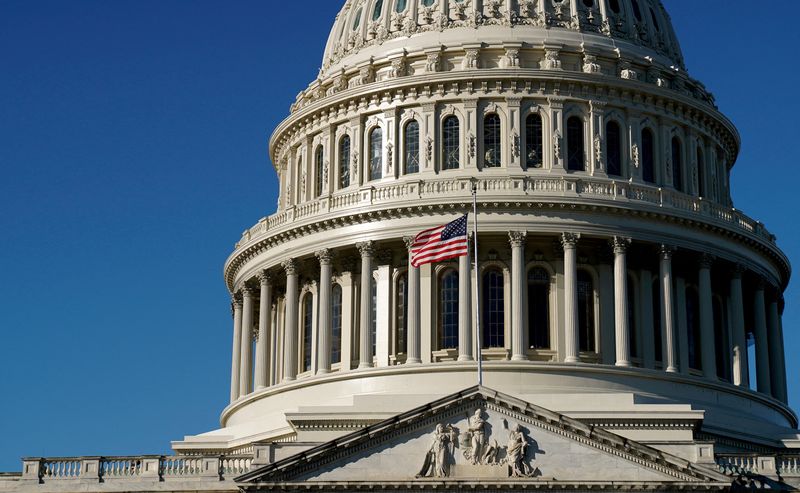By Richard Cowan
WASHINGTON (Reuters) -The U.S. Congress on Thursday gave final approval of legislation funding the government through March 11, avoiding the embarrassing spectacle of federal agencies having to shut many of their operations amid the Russia-Ukraine crisis.
The Senate acted as a midnight Friday deadline loomed, when existing funds were set to expire for operating most of the federal government.
The temporary funding bill passed in a bipartisan vote of 65-27 and now goes to President Joe Biden for signing into law.
It was needed because Congress so far has failed to pass any of the one-dozen regular appropriations bills for the fiscal year that began Oct. 1.
"A government shutdown would be useless, senseless. Can you imagine how that would look to the Russians?" Senate Appropriations Committee Chairman Patrick Leahy said during brief debate of the legislation.
This third stop-gap measure since last September, which the House of Representatives passed on Feb. 8, would give congressional Democrats and Republicans until March 11 to reach a deal on a massive spending bill to keep Washington humming through Sept. 30, the end of the current fiscal year.
The prolonged uncertainty over Washington's finances for operations including many military programs comes at a time when Russia has amassed around 150,000 troops at its border with Ukraine, stoking fears of a looming invasion that has rattled NATO nations and financial markets.
House-Senate negotiations on a spending deal likely would appropriate around $1.5 trillion in "discretionary" funds for an array of government programs, including those administered by the Pentagon, the Environmental Protection Agency, Health and Human Services and other Cabinet-level departments.
Failure to reach a deal by March 11 would leave Congress with three options: simply passing a bill extending current funding at levels approved by the former President Donald Trump's administration for the remainder of this fiscal year; approving a fourth temporary funding bill in the hope that a grand deal still can be negotiated, or letting funding lapse. The latter would trigger widespread furloughs of federal workers, shuttering many programs.
A long-term extension of current funding would cause some Pentagon layoffs, for example, and freeze National Institutes of Health funding for medical research at a time when the COVID-19 pandemic rages on.
The last time Congress failed to fund the government was in December 2018, when Democrats balked at funding then-President Donald Trump's U.S.-Mexico "border wall."
Following a record 35-day impasse, Trump found ways to partially circumvent Congress, but the so-called wall never was completed amid skepticism over its effectiveness.

This time around, Republicans are insisting that overall spending be split evenly between defense and non-defense programs. Democrats who narrowly control Congress have been seeking slightly more spending in the non-defense arena.
But if that top-line number is set, many disagreements would still have to be ironed out over individual programs.